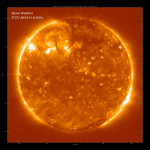Maybe a stupid question, but does my local weather affect what I can hear on shortwave?
I'm inclined to think if there is a massive thunderstorm in my area, the clouds and lightning will drown out many signals. But I'm also inclined to believe that if a radio signal travels through solid objects, clouds shouldn't be an issue.
Just something I thought of this morning. Do you guys find your reception changes because of the weather?
You have had some great answers so far. It can be argued that some of them are wrong, and some of them are right, but in general any errors are errors of omission. In crafting short responses the responders did not, really cannot without writing a book, cover all of the variables involved.
I am going to change the answer a bit by saying that local weather does not affect the shortwave signal itself. By local weather I am not including diurnal, seasonal, or solar cycle changes. Hear me out.
Local weather, rain, snow, fog, heavy clouds, lightning, etc, does not significantly impact the propagation of the signal from wherever in the World it is to you. It does not, in any significant way, decrease the signal level at your location. Sure, it can be argued that such local phenomena does change path loss or attenuation for the last few percent of the path, but realistically you are talking hundredths or tenths of a dB difference, not significant. Outside of a lab type environment you realistically can't tell such differences.
What local weather can do is change the local noise issue.
Static crashes from lightning. Rain static in an antenna, static caused by high winds and blowing sands, those kind of things. So local weather can raise the local noise floor and make it harder to hear the same signal, even if the same signal is not reduced in strength at your location.
But sometimes it (local weather) can also work in your favor. Here locally (the High Desert of California) we seldom get rain. Many times grounds are less than optimal, and dust builds up on power line insulators and antenna isolators. A hard rain, heavy snow, or a dense fog can come in and actually improve the noise floor by cleaning those insulators and improving grounds. During and immediately after a rain it is not uncommon for my average HF noise floor to be several dB lower, without reducing signals, than is my "norm". Outside of lightning crashes (short duration events that may be able to be filtered out, under some conditions) storms often make things better for me.
I think the take away here is that local weather does not affect the shortwave signal itself, they do not reduce the level of that signal by any important amount, but might change your local noise conditions, making it potentially harder, or easier, to hear. Most people only see the negative side of this.
T!


